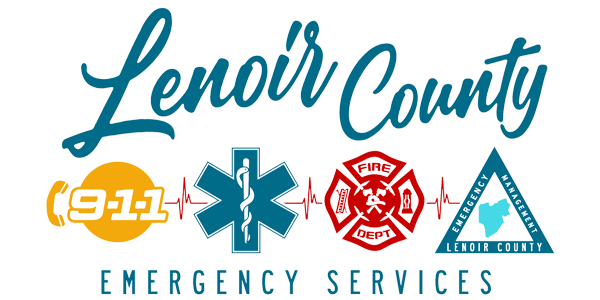E-911 Communications
Lenoir County Emergency Services Jones Lenoir/County 911 consists of an Operations Manager, 4 Telecommunicator Shift Commanders, and 16 full-time Telecommunicators. Our Communication center is staffed 24/7/365 and all of our communicators are trained using Priority Dispatch protocols and have the following certifications: Emergency Medical Dispatch, Emergency Fire Dispatch, Emergency Police Dispatch. You can rest assured that your call is being handled by a trained professional who will do his/her absolute best to make sure you receive the necessary assistance in a timely manner in the event of an emergency.
Telecommunicators are responsible for enhancing the quality of life of every person in Lenoir County by receiving and processing 911 emergency and non-emergency calls, and dispatching Emergency Response units in a prompt, efficient, and professional manner in an effort to help save lives, protect property, and assist the public and serving agencies, thereby making Lenoir and Jones Counties safer communities in which to live and work.
When handling calls, dispatchers question each caller carefully to determine the type, seriousness, and location of the emergency using protocols (medical, law, and fire) through Priority Dispatch. The information obtained is posted electronically to the CAD. The CAD system is a computer aided dispatch program that provides an interface to Enhanced 911 (E911). The dispatch screen has separate windows for browsing active calls, editing calls, tracking units assigned to calls, and all available units in Lenoir County. There are numerous personnel assignment, reporting, and mapping features. It is communicated/dispatched immediately to the appropriate emergency personnel, who quickly respond to the incident.
The Communications Center has a view of the entire Emergency Services system. The Telecommunicator will know what is going on in the cities and entire county at all times. Communications is the brain that takes the information, processes, directs, and coordinates the activities of the entire Emergency Services Department.
Calling 911
Dial 9-1-1 in an emergency only. If an emergency situation (a crime, fire, serious injury or illness) arises, ask yourself whether police, fire department, or medical assistance is needed right now to protect life or property. If the answer is “yes”, then immediately dial 9-1-1 and advise the telecommunicator of what has happened or is happening.
If you are not sure whether or not the situation is an emergency, call 9-1-1 and let the our telecommunicators make that determination. Always call 9-1-1 to report a fire, report a possible medical emergency, or to report a crime in progress.
When Calling 911, Remember to:
- Stay calm. Give the telecommunicator your name, location, and nature of the emergency.
- Listen carefully to the telecommunicator.
- When the telecommunicator asks you questions, try to answer them as accurately as possible. Speak clearly and slowly.
- Do exactly as the telecommunicator tells you during the course of the call.
- Never hang up until you are told to do so.
- Our telecommunicators are certified in Emergency Police Dispatch, Emergency Fire Dispatch, and Emergency Medical Dispatch through the National Academy of Emergency Dispatchers. This means when you call Lenoir County Communications your call is being handled by trained professionals following national protocols and standards of care.
Questions You May be Asked:
During the course of the call be prepared to answer some of the following questions.
- What is the address of the emergency?
- What is the phone number you are calling from?
- Okay, tell me exactly what happened.
- Please understand while the Telecommunicator is asking you questions, someone else is getting help on the way.
Safety Tips from the E-911 Division:
- Consider creating a contact in your wireless phone with the name “ICE” (in case of emergency), which list the phone numbers of people you want to have notified in an emergency.
- If your wireless phone is disconnected, you can still call 911. In the event the call gets disconnected, you will need to call 911 back. The Telecommunicators cannot call back disconnected cell phones. (Please do not give your children disconnected cell phones to play with)
- Text-2-911 – “Call if you can, text if you can’t” – To send a message, open a new text message and enter “911” in the recipient line. In the message space, be sure to include your location and the nature of the emergency. While texting may be convenient, there can be delayed communications, so it’s best to call 911 when you can and only text when you cannot.
- Language Line – Jones/Lenoir County 911 has the capability to bring a translator on the line to translate the information.
- TDD (Telecommunications Device for the Deaf) – This device, accessed through the 911 phone system, allows callers with hearing disabilities to seek emergency assistance without delay.
- “Why all the questions?” – Please remain on the line and answer all questions. The call has already been dispatched after location, phone number, and the type of emergency the caller is having. The Telecommunicator asks questions to better prepare the first responders that are en route to your location. Pre-Arrival Instructions and or Post-Dispatch Instructions are given to the caller to assist the persons until help arrives.

